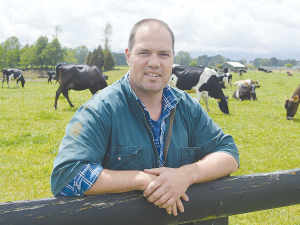$10/kgMS milk price tipped for strong 2025/26 season start
The 2025-26 season is set to start on a high and a $10/kgMS opening forecast milk price isn't being ruled out.
 Fonterra Co-operative Council chair James Barron says a diverse range of products and markets has allowed the co-op to respond to disruptions around the globe.
Fonterra Co-operative Council chair James Barron says a diverse range of products and markets has allowed the co-op to respond to disruptions around the globe.
Fonterra's council chair says the co-operative's third quarter results show the benefits of having a business of scale.
Fonterra Co-operative Council chair James Barron says a diverse range of products and markets has allowed the co-op to respond to disruptions around the globe.
"The results show again the benefits of joining together to form a co-operative of scale," says Barron.
"Utilising all of our diverse range of products and markets to respond to disruptions across the globe continues to underpin our co-op's performance."
Fonterra's third quarter result was a mixed bag: for nine months ending April 30, total normalised EBIT was $825 million, down $134 million, reflecting lower sales volumes, continued pressure on margins from the significantly higher milk price, on-going Covid-19 disruptions and the rapid decline of the Sri Lankan Rupee.
This was also reflected in Fonterra's net profit, down $131m to $472m.
The co-op's businesses in Greater China and Asia Pacific suffered due to Covid and Sri Lankan unrest. However, its Americas and Middle Eastern business performed very well.
The co-operative copped am $81 million hit in the key market of Sri Lanka, which has been facing political turmoil.
A rapid decline of the Sri Lankan rupee means it takes more Sri Lankan rupee to pay for Fonterra product purchased from New Zealand, which is sold in US dollars.
Sri Lanka is one of the few countries in the world where Fonterra collects and processes milk.
According to its website, since 1997, Fonterra Brands Lanka has been collecting milk from its local farmers for set and stirred yoghurt, drinking yoghurt, fresh milk and flavoured milk. Currently, milk is collected from 4,500 local dairy farmers. Sri Lanka is also a key market for milk powder from NZMP.
While Sri Lanka impacted Fonterra's APAC business, the co-operative's Africa, Middle East, Europe, North Asia and the Americas division (AMENA) continued to deliver a strong performance.
Normalised EBIT for AMENA was $406 million, up 30% due to improved gross margins in the ingredients channel, and a strong performance from the Chilean business.
However, Fonterra also took a hit in its Greater China divisions, thanks to Covid lockdowns in key cities.
In Greater China, ingredients continued to benefit from increased sales of higher margin products. However, normalised EBIT was down 17% to $317 million, due to continued pressure on margins from the higher milk price, particularly in foodservice, as well as the Covid-19 lockdowns.
Hurrell says he expects the impact of the lockdowns to show up in our fourth quarter results.
"Aside from some supermarkets, all restaurants and other food outlets were closed in Shanghai in early April to contain the Omicron outbreak.
"While restrictions have started to ease, a number of food outlets remain closed, while other cities across China are facing Covid-19 restrictions.
"The impacts of this, and the disruptions to supply chains, have been felt across the market are reflected in our Greater China sales volumes which are down on the same time last year."
Former Fonterra executive Alex Turnbull has been appointed CEO to lead all five Yili Oceania Business Division companies in New Zealand.
Fonterra executive René Dedoncker is leaving the co-operative later this year to lead Australian agribusiness Elders.
Alliance Group and the Southland Stags rugby team have joined forces in a partnership that will see the the meat co-operative's farmgate brand feature on players' team kits and replica jerseys.
Fonterra's plan to expand its organic programme to the South Island is being well received by farmers, the co-op says.
Voting has started for the renewal of DairyNZ's milksolids levy.
The most successful catchment groups in NZ are those that have 'a source to sea' approach.
OPINION: A dairy version of fantasy football has been launched.
OPINION: In recent weeks beaches in Auckland, Wellington and Christchurch have been unsafe to swim in because of recent heavy…